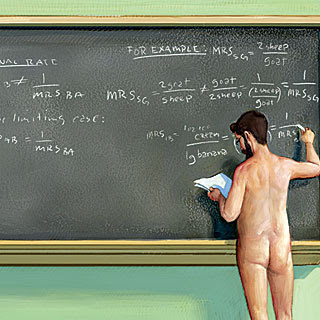 Welcome back to campus. With the new term comes an all new and improved Economics TeaBA. This term promises to offer more beverages, more insight, more excitement than all of the prior terms of economics TeaBA combined.
Welcome back to campus. With the new term comes an all new and improved Economics TeaBA. This term promises to offer more beverages, more insight, more excitement than all of the prior terms of economics TeaBA combined.
For those of you who are new to this, the economics faculty and students began meeting Mondays for cookies and discussion last term. The faculty turnout has been outstanding, including all of the regular faculty and emeritus professor Corry Azzi, and we have had occasional visitors from mathematics and other disciplines. Generally, it is a time for informal discussion, but we will occasionally have a formal presentation or another matter to discuss. It certainly lets you know where you can find at least one of us if you need some help.
Things (like the water and coffee) get heated up every Monday at 4:15 in Briggs 217.
See you there.
 Before I catalog my notes on the last section of the book, The Sage, I’d like to simply point out some excellent resources that have helped me to put Schumpeter’s work in context. Indeed, that is one of the main challenges for economists today, I think, is what was genuinely important about Schumpeter’s work and what wasn’t.
Before I catalog my notes on the last section of the book, The Sage, I’d like to simply point out some excellent resources that have helped me to put Schumpeter’s work in context. Indeed, that is one of the main challenges for economists today, I think, is what was genuinely important about Schumpeter’s work and what wasn’t. This is a continuing live blog for
This is a continuing live blog for  I’m sure that I am not the only member of the
I’m sure that I am not the only member of the  The Economist is hosting an
The Economist is hosting an 
